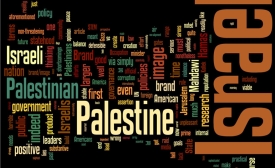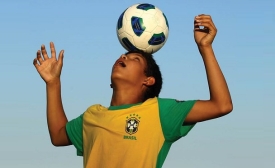nation branding
After a month of football in a country where the sport is regarded a religion, we look at how the World Cup has affected the volatile political situation in Brazil and what will happen now that the tournament has come to an end.
After hours spent performing cartwheels, American show tunes and a series of jazzy dance routines in a cramped studio on West 28th Street in Manhattan, 8-year-old Futaba Kawakami left TADA Youth Theater camp earlier this week, clammy and slightly hoarse. She pulled off her new camp T-shirt, the one with the slogan Sing! Dance! Act! emblazoned on the back, and marshaled enough energy to ask her mother for ice cream.
I’m sitting in a café in Jerusalem’s posh German Colony, an area of town reminiscent of Boston’s Newbury Street, on a lovely, if a touch excessively warm, summer Friday morning. As I’ve been here for a month doing archival research for my next book, Cast a Giant Shadow: Israel’s Image-Making efforts in America 1948-78, I’m thinking a lot about nation branding. But at the moment, I’m thinking less about Israel’s image and “brand” in the U.S. than I am about Palestine’s.
Roger Kittleson, Brazil expert and Professor of History at Williams College, is interviewed by Bryony Inge about his new book; The Country of Football: Soccer and the Making of Modern Brazil. In this podcast he discusses the relationship between soccer and Brazilian identity, and whether the Brazilian government is likely to use sport as a tool to achieve its policy goals.

This week, we learned that enhancing Brazil's national image through soccer has pitfalls and obstacles (thanks, Germany).

CPD Blogger Neal Rosendorf shares his thoughts on 'Brand Palestine.'

Listen to CPD's interview with Roger Kittleson about The Country of Football: Soccer and the Making of Modern Brazil.
As the Brazil team has come spectacularly undone in the World Cup, the pain for the host country has been compounded by the prospect that its hated rival, Argentina, could still lift the championship trophy on Sunday in Rio de Janeiro’s fabled Estádio do Maracanã, after Argentina won a tense semifinal against the Netherlands in a penalty shootout on Wednesday afternoon. The tens of thousands of Argentine fans who have invaded Brazil to cheer for their team, and taunt their hosts, brought with them a song that predicts not just triumph for Argentina, but deep humiliation for Brazil.







